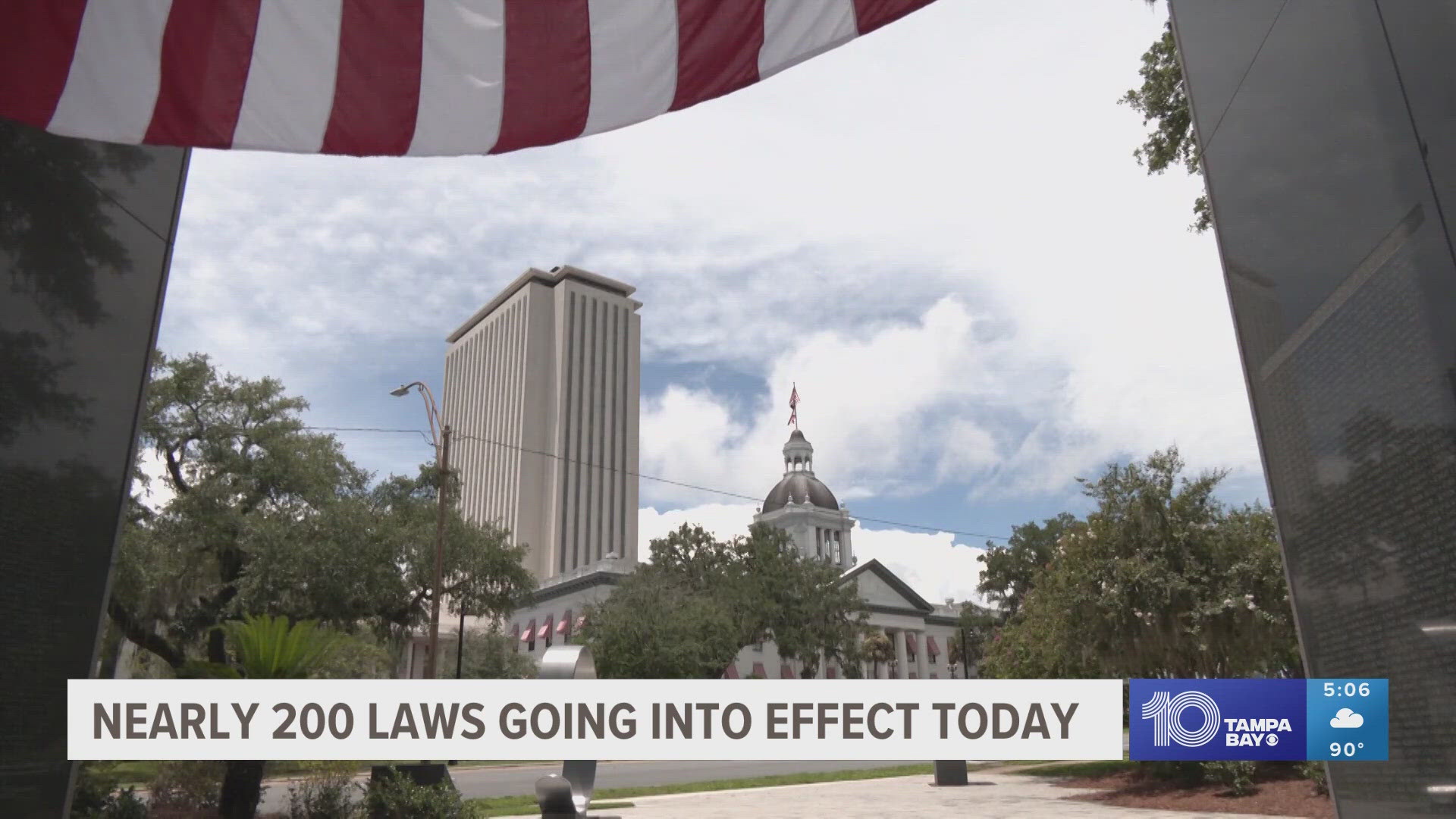TAMPA, Fla. — As Gov. Ron DeSantis looks over the final bills on his desk from the 2024 legislative session, several laws are slated to go into effect on July 1.
So far, the Florida governor has signed 262 bills from the session and vetoed three.
Here are 10 bills that will go into effect in just a few weeks:
HB 601: Law Enforcement and Correctional Officers
Civilian oversight boards that investigate misconduct complaints will be stripped of their power, according to this new law.
County sheriffs will not establish boards to review the policies and procedures of the sheriffs’ offices. This gives the state control of investigating complaints against law enforcement and correctional officers and takes authority away from local officials.
HB 1645: Energy Resources
This bill will ban power-generating wind turbines offshore or near the state’s coastlines. It will boost the expansion of natural gas and reduce regulation on gas pipelines.
Local governments won’t be able to enact some energy policy restrictions and buying fuel-efficient vehicles won’t be a priority for government agencies.
HB 305: Offenses Involving Children
Courts will need to accept out-of-court statements made by victims of abuse who are minors. Previously, the court would only accept these kinds of statements from victims 16 or younger.
The bipartisan legislation is for minors who might not feel comfortable speaking in the courtroom or may have a hard time recounting the abuse under stressful circumstances.
HB 621: Property Rights
Law enforcement will be able to immediately arrest “squatters” who are not permitted to be in homes if the owner files a complaint.
The bipartisan bill makes it a misdemeanor to present a fraudulent lease to officers and makes it a felony to intentionally sell or lease someone else’s property or intentionally cause more than $1,000 in damage while squatting or trespassing.
Before this new law, squatters were considered tenants, and the process to evict them would be lengthy.
House Bill 1029: My Safe Florida Condominium Pilot Program
This bill creates the My Safe Florida Home program for condo owners. The original program is for homeowners who can apply for a grant to get a free home inspection report that tells them if their home is hurricane-ready.
Condo associations could get up to $175,000 for window, door and roof upgrades. DeSantis set aside $30 million in the budget for the program.
"This program will go a long way in helping them pay for some of those costs, we want to make sure these buildings are resilient and structurally sound," said State Sen. Nick DiCeglie, who co-sponsored the legislation.
These features and inspections can help condo owners save money on insurance premiums.
House Bill 931: School Chaplains
This law will implement a state-wide school program allowing districts and charter schools to have volunteer chaplains.
The goal of this is to give students an option to receive counseling and support. Parents will have to provide written consent for their child to speak to a chaplain. Schools also must have a list of chaplains and their religious affiliations. The participating chaplains will be required to go through background checks.
HB 433: Employment Regulation
This controversial law will ban local government from requiring its contractors to pay higher wages or take extra steps to protect workers from heat exposure.
Local governments will not have to establish policies that aren’t required by law. The governments also cannot require contractors to have work schedules letting workers know in advance when they will have to work.
The bill went back and forth between chambers, and it passed 24-15 in the Senate and 74-36 in the House.
Republican Rep. Tiffany Esposito, who sponsored the bill, said if a company can’t run their business and staff if they have schedule changes and can’t make those changes within a two-week timeframe.
Rep. Michele K. Rayner, D-St. Petersburg, brought up her concerns for counties like Miami-Dade where workers are paid $22 an hour on county contracts versus the state minimum wage of $12.
“Is there anywhere in this bill that would allow local communities to address that specific gap that they will be facing?” she said. Rayner, who voted against the bill, also questioned how the bill would safeguard against adverse working standings, like the Florida heat.
In response, Esposito said if a worker doesn’t feel his or her employer is offering enough, the worker can find another job.
HB 775: Surrendered Infants
This bipartisan law increases the age at which a baby can be surrendered under the state’s “Safe Haven Law” from seven days to 30 days old.
Current law allows parents who are unwilling or unable to take care of their newborns to surrender them at hospitals, fire stations and EMS stations. The new law would raise the age and would let parents leave their infant with hospital medical staff after the baby is born.
Parents can also call 911 and request to meet with EMS providers to surrender the baby.
House Bill 241: Coverage for Skin Cancer Screenings
This bill will require the Department of Management Services to provide coverage and payment through state employee health insurance for annual skin cancer screenings without patients having a co-pay.
The goal is to detect cancer early because there is a 99% five-year survival rate if caught early, according to the American Cancer Society.
The department will have until Jan 1 to require health insurance plans for state workers to provide coverage.
HB 201: Emergency Refills of Insulin
Patients will be able to receive three nonconsecutive emergency refills of insulin if their pharmacist can’t obtain authorization from a prescriber.
This was passed unanimously in the legislature.

